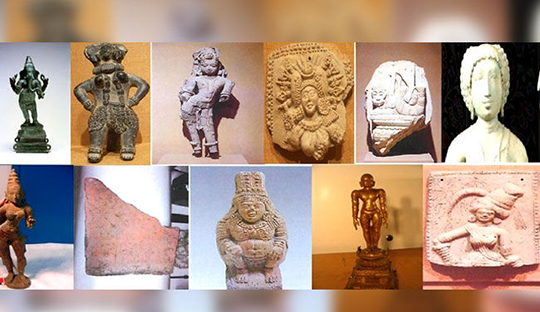Washington, Jun 7: The US today returned to India over 200 stolen cultural artifacts, some dating back 2,000 years, estimated at USD 100 million, with Prime Minister Narendra Modi describing the cultural heritage as a great binding force in bilateral relationships.

"Usually relationship between the countries of the world are very often covered by the present. It is present that plays a big role, but sometimes heritage becomes important in the relations of two countries. Sometimes what cannot be done by living persons is done by idols," the Prime Minister said at a ceremony held at the Blair House for the return of stolen artifacts to India.
Speaking in Hindi, the Prime Minister said that in the last two years various countries have endeavoured to return India's stolen cultural heritage.
"Both governments and law enforcement agencies of these countries now have become more alert on trafficking of cultural artifacts and are not only working to prevent it but also to send it back to the place of its origin," the Prime Minister said.
"I am grateful to the United States and President (Barack) Obama for returning these treasures to India which join us to our past," he said.
"For some, these artifacts may be measured in monetary terms and could be in millions for them, but for the people of India, it is a part of our culture and heritage that joins us to our past, that joins us to our values," the Prime Minister said in his brief remarks.
Modi said many tourists don't want to see only modern sites, but also they want to see the rich history a place offers.
People are attracted to India for its ancient civilisation, he said.
Referring to the Indus Valley civilisation, he said tourists are now flocking to India to see towns dating back 5,000 years.
"There treasures are to be enjoyed by the entire world. Technology can help us catch those indulging in illicit trafficking," the Prime Minister said.
Indian Ambassador to the US Arun K Singh said on Monday 12 artifacts have been returned and process has begun for the transfer of rest of the treasured artifacts.
Items returned included religious statues, bronzes and terra-cotta pieces, some dating back 2,000 years, looted from some of India's most treasured religious sites.
Among the pieces returned is a statue of Saint Manikkavichavakar, a Hindu mystic and poet from the Chola period (circa 850 AD to 1250 AD) stolen from the Sivan Temple in Chennai, which is valued at USD 1.5 million. Also included in the collection is a bronze sculpture of the Hindu god Ganesh estimated to be 1,000-year-old.
The artifacts that speak about India's astounding history and beautiful culture are beginning their journey home, said US Attorney General Loretta E Lynch.
"It is my hope – and the hope of the American people – that this repatriation will serve as a sign of our great respect for India's culture; our deep admiration for its people; and our sincere appreciation for the ties between our nations," she said.
"Protecting the cultural heritage of our global community is important work and we are committed to identifying and returning these priceless items to their countries of origin and rightful owners," said Secretary of Homeland Security Jeh Johnson said in a statement.
Johnson was not present at the repatriation ceremony.
"It's the responsibility of law enforcement worldwide to ensure criminal smuggling organisations do not profit from the theft of these culturally and historically valuable items," he said.
The majority of the pieces repatriated in the ceremony were seized during Operation Hidden Idol, an investigation that began in 2007 after Homeland Security Investigations (HSI) special agents received a tip about a shipment of seven crates destined for the US manifested as "marble garden table sets."
Examination of the shipment in question revealed numerous antiquities.
This shipment was imported by Subhash Kapoor, owner of Art of the Past Gallery.
HSI's Operation Hidden Idol focused on the activities of former New York-based art dealer Kapoor, currently in custody in India awaiting trial for allegedly looting tens of millions of dollars' worth of rare antiquities from several nations, a statement said.
Artifacts were also found in the Honolulu Museum and Peabody Essex, who promptly partnered with HSI to surrender illicit cultural property stemming from Kapoor.
HSI special agents have executed a series of search warrants targeting Kapoor’s New York City gallery, along with warehouses and storage facilities linked to the dealer.
Additionally, five individuals have been arrested in the US for their role in the scheme, a statement said.





Comments
Add new comment